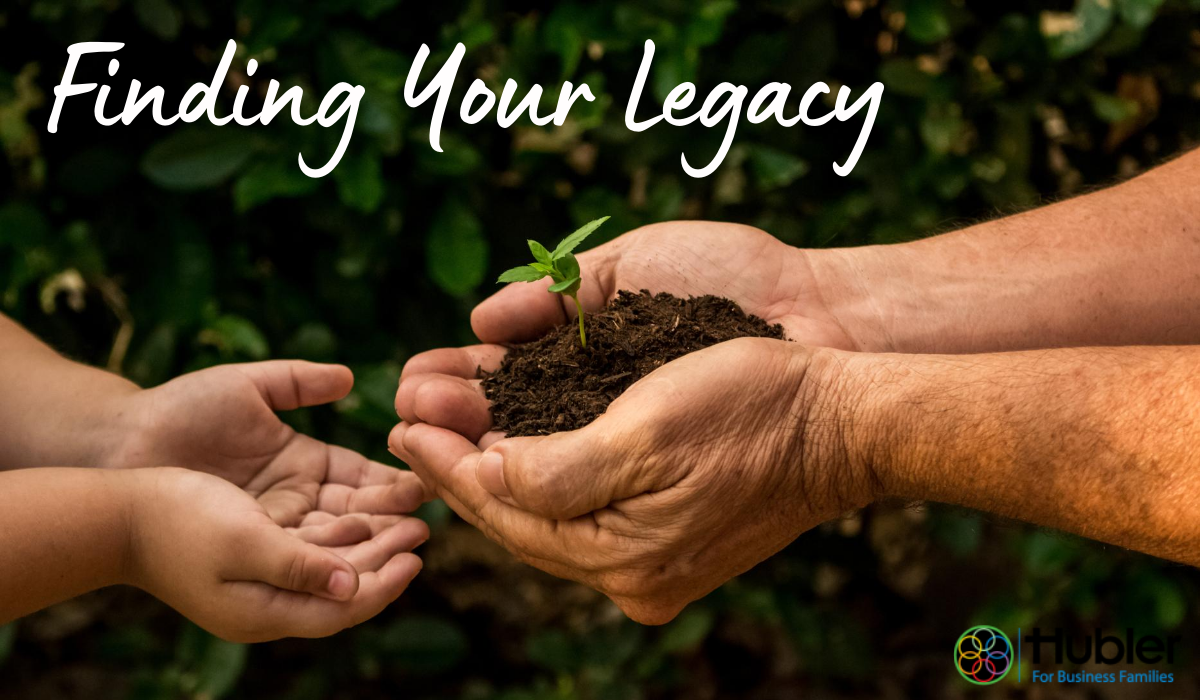Hubler’s Legacy Model™:
- Wealth Care (Money/Property): This is the primary financial aspect of legacy, defining how you want to transfer wealth, financial inheritance, valuable personal property, and more. Things to consider in the Wealth Care area are wills (who gets what?), taxes (how will my beneficiaries avoid large tax penalties?), trusts (how and when will my wealth be distributed?), investments, and more. A dedicated financial consultant can help you work out all the details about your wealth care wishes, but it’s important to more broadly view it as only one related aspect of many when it comes to building your legacy.
- Heritage (History/Ancestry): Many people see themselves as one link in the chain of a family history, and place huge importance on passing the family history and ancestry onto future generations. So when working on defining your legacy, begin to think about what you value in the legacies of generations before you--are there unique stories you wish to tell your children and grandchildren? Meaningful heirlooms you want to see stay within the family? Lessons, values, work ethics, and traditions that were taught to you by family that came before and you’d like to see continued? These are all considerations you must take into account.
- Family & Self (Loving/Caring): While Heritage is all about passing on the gifts given to you by generations before, the area of Family & Self is all about how you connect with yourself and your individual family unit. How do you want to inspire your children to succeed in their own lives? What life meaning have you discovered and wish to share? Have you lived your life with purpose and found fulfillment? These questions and many more help define your personal legacy.
- Business Legacy (Succession Plan): As entrepreneurs, our businesses are significant parts of our identities. We hope that when we retire, we leave a successful business, run with the values that helped build it, to continue for years to come. When it comes time to pass the business on to others and take our hard-earned retirement, to whom are we passing ownership? Will it stay in the family? Will we create a board of directors? Who will lead the business to continued success? With our business a key part of our personal legacies, a well-considered succession plan is vital to making sure it doesn’t fall apart during a time of transition.
- Community (Service-Philanthropy): For even the most dedicated entrepreneur, business success will risk ringing hollow if it’s the only lasting part of their legacy. The vast majority of people care deeply about building community and helping those around them, and many people want to leave a legacy of philanthropic endeavors, whether they involve volunteering, charitable giving, or whatever an individual feels called to do. So look inward and outward simultaneously--who do you want to help? What organizations could use your support? Are you in a place to give time, to give money, to give expertise? Find something you care deeply about (if you don’t already know), and commit to living out your values to assist that cause.
According to Tom Hubler in his book The Soul of the Family Business, “Fine-tuning a legacy system requires implementing all five aspects of the model. It’s important to capture stories that relate to family and history, and to consciously voice life and family values.” For a lot of us, these aspects of our legacies are things we understand intuitively--but the difficulty comes in bringing them to the forefront and considering them with mindfulness and intentionality. Doing so enables us to truly build and define our legacies, rather than leave them as nebulous hopes and dreams.
For stories of successful legacy planning, pick up The Soul of the Family Business by Tom Hubler. Through personal anecdotes, real-world case studies, useful tools and frameworks, and more, Hubler offers an in-depth look at how entrepreneurs can leave a lasting impact on the world around them. You can pick up The Soul of the Family Business, available in hardcover form on Amazon.com, directly through Itasca Books, or at a bookstore near you. And of course, if you’re ready to take the next steps, you can always contact Hubler for Business Families today.


 RSS Feed
RSS Feed
